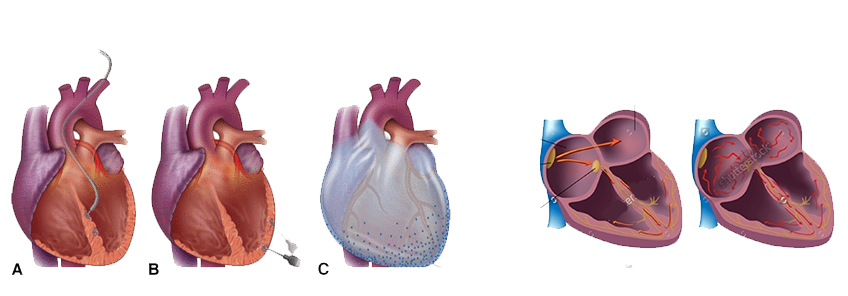Atrial Fibrillation (AF)

- Palpitations: feel of fast and irregular heart beat and is annoying;
- Fatigue;
- Fainting;
- Shortness of breath;
- Dizziness;
- Chest pain or discomfort; or
- Confusion.
- Old age;
- Family history of atrial fibrillation;
- Heart diseases: heart failure, valvular heart disease, coronary artery disease, heart surgery, etc;
- Hypertension;
- Excessive alcohol and caffeine consumption;
- Obesity;
- Chronic medical conditions: hyperthyroidism, side effect of certain drugs such as theophylline, sleep apnea, chronic lung diseases, chronic kidney disease, diabetes etc;
- Acute stress from severe medical illness like pneumonia or illness that need ICU care.
- When electrocardiogram does not reveal any abnormality, your heart may need to be monitored for a longer period with a Holter monitor or an event recorder.
- Echocardiography: It is done to look for heart failure or heart valve problems.
- Blood tests: These are done to screen for other associated disorders like thyroid disorders, diabetes etc.
- Lung function tests are done to detect lung disease.
- Sleep studies are done to look for sleep apnea.
- Stress test to find out coronary artery disease.
- Chest xray to rule out lung disease.
- Complex cardiac disease;
- AF remains symptomatic on pharmacologic rate control or cannot tolerate pharmacologic rate control;
- You are potential candidates for ablation or other surgical treatment; or
- You require a pacemaker or defibrillator.
- Symptoms of atrial fibrillation is managed either by reducing the heart rate with medications or by converting the abnormal rhythm to normal by medication or electric shock.
- If AF is caused by coronary artery disease, the treatment modalities could be lifestyle modification, antihypertensive drugs, cholesterol lowering medications and bypass surgery.
- Thyroid disorders leading to AF are treated with antithyroid drugs, radiation or surgery.
- Rheumatic heart disease is treated by surgical correction of valve damage, along with supportive medicines to control heart failure and regular penicillin injection to prevent from recurrence of rheumatic fever.
- Anticoagulants like warfarin are given to reduce the chance of forming a blood clot and having a stroke. This is particularly important in atrial fibrillation resulting from diseases that damage the valve of the heart such as rheumatic heart disease.
- Alternate ways like radiofrequency catheter ablation, use of a pacemaker, and surgical treatments may be considered in cases which are not controlled by using medication.
- Having healthy diet, avoiding saturated fats;
- Quitting smoking and cutting down alcohol;
- Maintaining active lifestyle;
- Maintaining healthy weight;
- Keeping a check in blood pressure and cholesterol.
Atrial Fibrillation (AF) is a disorder of heart rhythm that manifests as an irregular heartbeat. Usually, it is associated with rapid heart rate ranging from 100 to 170 beats per minute. But you can have atrial fibrillation with normal heart rate specially if you are treated with medication. Atrial fibrillation is a serious condition as it increases the risk of stroke, other heart conditions and even death.
It is a common condition affecting more men than women. Although it can occur in any age, it is more common in old age. It occurs in about 1 percent of patients less than 60 years of age and about 8 percent of elderly patients over 80 years.
In atrial fibrillation, the upper two chambers of the heart (atria) contract fast but ineffectively. Because of this, the blood from upper chamber does not reach the lower chamber. The normal coordination between the upper chambers and lower chambers is also lost and blood is not pumped out of the heart in regular manner in adequate amounts. This leads to the symptoms of:
If you experience the symptoms and feel there is something wrong with your heartbeat, you should immediately see your doctor. You can detect heart rhythm disorder by simply assessing your pulse.
However, atrial fibrillation can be asymptomatic. It can be paroxysmal (that happens intermittently and resolves without treatment), persistent (does not resolve without treatment) or permanent/chronic (persists even after treatment).
Causes
Sometimes there is no apparent cause of atrial fibrillation. Certain factors increase your risk of developing atrial fibrillation:
Diagnosis
Atrial fibrillation is diagnosed based on the symptoms and an electrocardiogram that shows irregularly irregular heart rate. Your doctor will review your symptoms, your personal and family medical history to assess for risk factors and possible triggers. Your doctor will conduct a detailed examination especially focusing on cardiovascular system.
To make a confirmed diagnosis, the doctor will conduct some tests on you.
You will be referred to a cardiologist if you have the following situations:
Treatment options
The goals of treatment in atrial fibrillation is to control symptoms, decrease the risk of complications, like stroke and heart failure and treat the underlying cause.
Symptoms control:
Treatment of underlying causes:
Stroke risk reduction:
Surgical treatment option:
Prevention
Atrial fibrillation caused by coronary artery disease can be prevented through:



Send us your feedback on this article